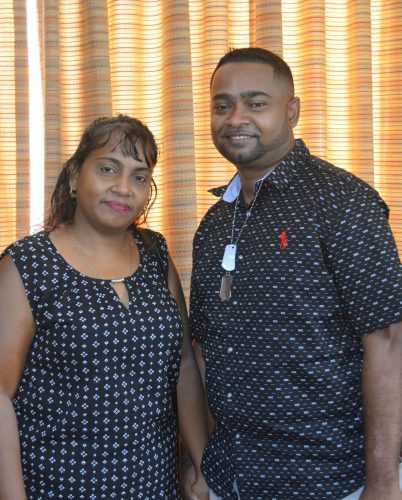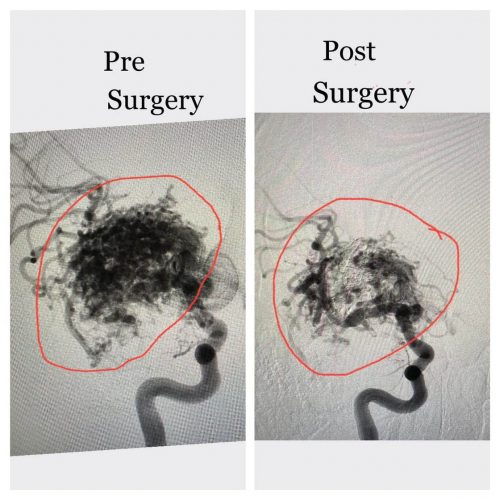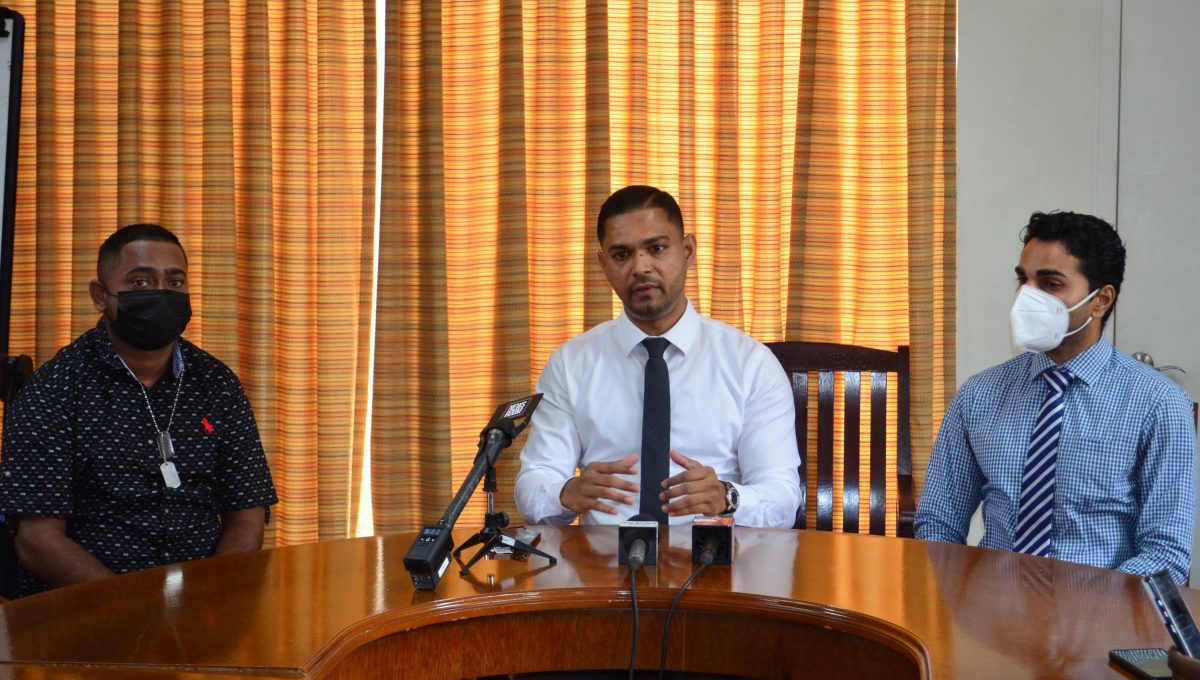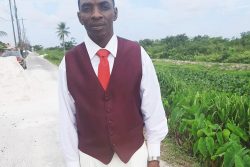Life has begun to return to normal for Police Corporal Amit Bacchus, who recently underwent a lifesaving surgery to remove the largest arteriovenous malformation (AVM) diagnosed locally.
The surgery was done at the Woodlands Hospital catheterization (CATH) laboratory by a team of doctors led by neurosurgeon Dr Amarnauth Dukhi and supported by internationally-renowned intervention radiologist Dr Thyrous Yorkis.
It cost approximately $6 million, a small percentage of the US$200,000 usually charged overseas. Bacchus was able to offset the medical expense with assistance from the Ministry of Health, the Guyana Police Force (GPF) and a number of private donors.

At a press conference held at the Woodlands Hospital boardroom yesterday morning, Dr Dukhi said that Bacchus is the second patient who has benefitted from a minimally invasive AVM surgery in Guyana.
The first, he said was performed on a 26-year-old female resident of Berbice.
However, he noted that Bacchus had the largest AVM ever diagnosed in his entire career. “It was not just an ordinary arteriovenous malformation in this case. It was an extremely large AVM. AVM by itself falls into the category of vascular neurosurgery….In neurosurgery, vascular neurosurgery is considered to be the most difficult, the most tedious and the most technical,” D Dukhi explained.

According to the Mayo Clinic website, a brain AVM is a tangle of abnormal blood vessels connecting arteries and veins. It explains that the arteries are responsible for taking oxygen-rich blood from the heart to the brain, while the veins carry the oxygen-depleted blood back to the lungs and heart. As a result, it says that a brain AVM disrupts this vital process.
The site also noted that while an AVM can develop anywhere in a person’s body, it occurs most often in the brain or spine.
Dr Dukhi told reporters that 1 in every 2,000 patients is diagnosed with an AVM. “To operate brain AVM, we can either do it two ways. One is open surgery, where opening the brain is part of that procedure, or minimally invasive,” Dr Dukhi said.
Bacchus had a Grade 5 AVM and according to Dr Dukhi “no part of the world a Grade 5 AVM is operated [on] with an open surgery because the risk of bleeding is extremely high”.
According to Dr Dukhi, Grade 5 AVMs are “extremely” difficult to treat even via minimally invasive surgery since the risk of rupture even during surgery is “very high”.
“If it had bled, his chance for survival would have been minimal,” he added.
Taking into consideration the risks attached, Dr Dukhi said the team was only able to remove 75 per cent of Bacchus’ AVM during the procedure.
Within the next three to six months, Bacchus is likely to have to undergo another surgery where the remaining 25 per cent will be removed. “The risk of him bleeding trying to obliterate all 100 was… extremely high and when you elevate the risk advantage factor during a surgery you have to know when to stop. It’s key,” Dr Dukhi said.
110%
Bacchus, who was present during the press conference, expressed gratitude to Dr Dukhi and his team along who all his donors. “As Dr Dukhi said, I had a lot of risk in this surgery….By God grace since I finish this surgery like a month now. I am not just 100 but I am 110 per cent,” he said.
Bacchus, a resident of Diamond, East Bank Demerara (EBD) was initially evaluated on November 9, 2019, after he experienced seizures and vomiting, years after suffering an assault to the head.
His diagnosis was confirmed following a computerized tomography (CT) scan and a Magnetic Resonance Angiography (MRA).
He recalled how he felt before he was diagnosed. “…On the job sometimes I does feel light headed. Sometime my body does feel extra tired and I am not doing any work,” Bacchus noted.
Presently, he said, things that he was unable to do prior to surgery he can now get done without any difficulty. “Things like riding a simple bicycle I couldn’t do because I couldn’t tell when a seizure would come on. But now I could do everything. I don’t have any side effects anymore,” he related.
The police officer is advising persons to have regular health check-ups and not to take their health for granted, “If someone is sick, something is causing that sickness so go to the doctor, do not wait until it gets bad,” he urged.
Dr Dukhi said once fully recovered, Bacchus will be able to return to work. “We are happy to say that we have Mr Amit here without any neurological deficit. He doesn’t look like someone who just had a major brain surgery and where his chances of survival was very low…I think his chances of moving forward with a normal life is extremely good. The seizures battles, as long as he takes his medication, should come to a halt and of course returning to the Guyana Police Force is a must so he can carry on his work in protecting us,” he explained.










